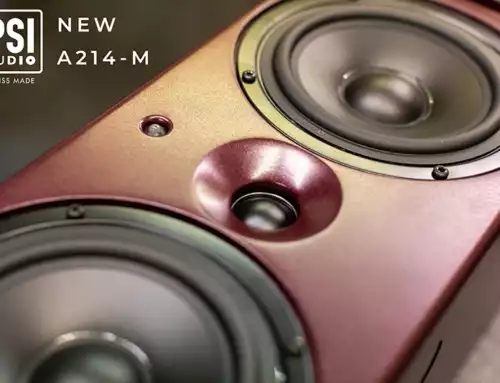PSI Audio uses proprietary technology to achieve the incredible accuracy it is known for. With Adaptive Output Impedance (AOI), the Swiss manufacturer counteracts the effects of driver resonances that can lead to distinct colourization. AOI constantly monitors the driver’s movement and feeds this information back into the amplifier, modifying its output impedance. The result is an exceptionally clear and precise sound image of the audio input, without any colouration. Hifi enthusiasts attending HIGH END 2019 from 9th to 12th May in Munich, Germany, can experience the Adaptive Output Impedance in the new Héritage3 in A4.2 E226.
The contents of this press release
PSI Audio employs Adaptive Output Impedance in all its speaker designs
The problem: material resonances
The solution: Adaptive Output Impedance
The result: precise transients with no colouration
Adaptive Output Impedance in action
Yverdon-les-Bains, XX May 2019 – PSI Audio is proud to produce the most accurate active loudspeakers available. Achieving this level of playback precision is no trivial matter and requires well thought out designs and clever technology. One of the sophisticated systems PSI Audio uses to ensure the accuracy of its speakers is AOI, the Adaptive Output Impedance.
The problem: material resonances
Every component used in the creation of drivers is made of physical materials, and every such material has its own properties. One such property is resonance, especially of a mobile mass: depending on shape, mass and material used, every system comprised of membrane, voice coil and suspension will resonate at specific frequencies more eagerly than at others. These resonances shape the audio reproduction, they colour it. The transducer will move more easily at certain frequencies, thus pronouncing these frequencies and making them more prominent. Since the choice of material depends on a lot of other factors, like weight and rigidity of the membrane, resonance frequencies and the resulting colouration must either be accepted – or be accounted for in the circuitry. Aiming for absolute precision, PSI Audio chose the latter option and created the Adaptive Output Impedance.
The solution: Adaptive Output Impedance
When a driver resonates at certain frequencies, it moves more easily, exaggerating these frequencies. The Adaptive Output Impedance, or AOI for short, puts an end to resonating drivers by constantly monitoring the membrane’s movement and feeding this information back into the amplifier, thus controlling the resonances. The whole process is instantaneous due to the use of analogue technology exclusively. Digital means would introduce latency, while in the analogue realm effects can work at light speed. As AOI needs to work in the very moment resonance occurs, analogue circuitry is the only way to achieve the accuracy PSI Audio is known for.
The result: precise transients with no colouration
Combined with other PSI Audio technologies like Compensated Phase Response and the proprietary Class G/H amplifiers, the Adaptive Output Impedance achieves an outstanding sonic performance. PSI Audio speakers deliver all the accuracy and precision discerning listeners from both the professional and home user fields require. Music and audio in general retain all their original properties, with all frequencies in their right places and all the transients fully intact. PSI Audio and its Adaptive Output Impedance allow for perfectly accurate audio reproduction in professional studios and private homes alike.
Adaptive Output Impedance in action
PSI Audio uses the Adaptive Output Impedance in all its speakers, from the active nearfield monitors like the A21-M to the larger three-way systems like the all-new A23-M and in the new foray into the home audio field, the Héritage3. Both the A23-M and the Héritage3 can be experienced at HIGH END 2019 hifi show in Munich, Germany, from 9th to 12th May at A4.2 E226.






